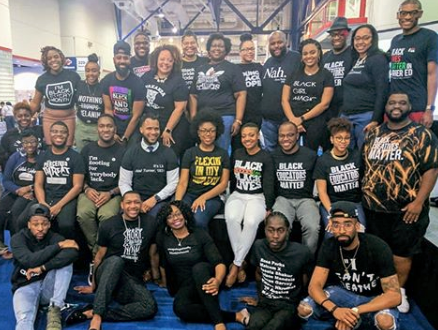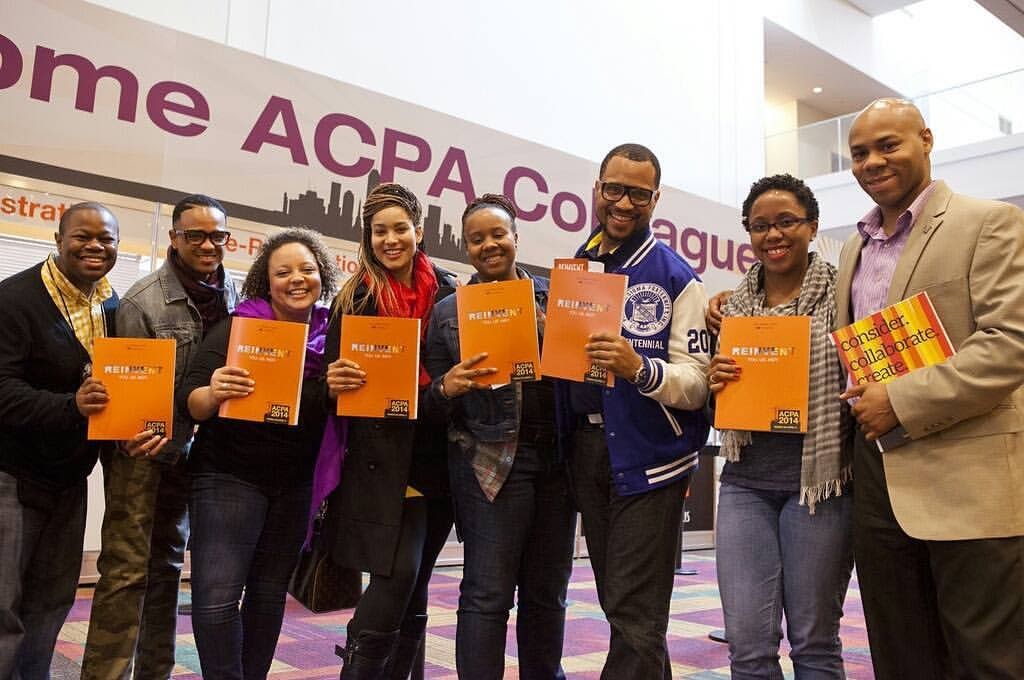
Thank you for stopping by to learn more about the ACPA Pan African Network. Take some time to look through our content and don’t hesitate to share how you’d like to get involved. Use the menu below to jump to a section of interest.
For more information, or to get involved, email cma_pan@acpa.nche.edu.
who we are
The Pan African Network (PAN) is one of four Networks within the Coalition on Multicultural Affairs (CMA) of the American College Personnel Association (ACPA). CMA serves as a liaison to ACPA’s leadership, focusing attention on issues in education and trends, which affect students and professionals of color in the College Student Personnel field.
Specifically, CMA is composed of four singular networks: Asian Pacific American Network (APAN), Latinx Network (LN), Multiracial Network (MRN), and Pan African Network (PAN). All four Networks work collectively to promote diversity within ACPA. CMA is a nationally visible and action-oriented group that addresses the changing cultural dynamic within higher education institutions and works to create multicultural strategies and solutions.

mission
The Mission of The Pan African Network (PAN) is to provide programs and resources that service the needs of ACPA members who identify with–and support the causes of– the Pan African community. PAN strives to accomplish its purpose through the implementation of six Core Values, which serve as guidelines for our programmatic outcomes: Educational Leadership, Collaboration, Fellowship, Advocacy, Professional Development, and Mentoring.
Vision
The Pan African Network values its visible presence within the CMA and the larger ACPA body. PAN is committed to promoting the issues of all individuals of African heritage in higher education. As we progress through the 21st century, PAN will continue to
(1) champion issues and advocate the needs of the Pan African culture
(2) cultivate scholarly achievement through conference presentations and publication, and
(3) increase leadership opportunities and professional development within the organization and the field of higher education.
In recognizing the value of learning, growth and development, PAN provides networking opportunities for all its members and seeks to create an environment of support and professional development. As a body, we seek to be inclusive and welcoming to ACPA members who are interested and/or have a desire to advancing the goals and objectives of PAN.

An Abbreviated History of PAN
The unique history of the Pan African Network is grounded in much of what’s documented about The Standing Committee on Multicultural Affairs (CMA). The Standing Committee on Multicultural Affairs saw its beginnings at the April 11, 1968 Executive Council meeting of the American College Personnel Association when the Task Force on Race and the College Community was established. This Task Force was charged with submitting a final report of its findings the following year. At the March 30, 1969 meeting, this report was accepted and included a request for the funding and support of the Black Task Force Committee.
The Black Task Force Committee was created to ensure that sensitivity was given to the presence and needs of Black faculty, staff, and students. Initially, it was understood that the committee would convene on a temporary basis; but the association soon realized that the needs of its Pan African population were especially complex and could not be remedied by temporary solutions. Therefore, the Black Task Force Committee remained active within the larger organization. Within a few years of its development, the work of the Task Force purportedly conflicted with the Commission’s already established in ACPA, both with regard to meeting schedules and the availability of ACPA resources. Soon, the Task Force was perceived solely as a space for Black members by the ACPA delegation rather than a cooperative entity pursuant of minority interests. This conflict was exacerbated by the fact that ACPA Senators were voting on minority issues without seeking input from the Task Force, as it was regarded as an exclusively Black establishment.
In 1975, dialogue surrounding the inclusion of other races and ethnicities evolved into a discussion on the purpose of the Task Force. As a result, the Black Task Force transitioned into the Minority Task Force. The ACPA Minority Task Force served as a vehicle for informing ACPA’s approach to implementing services inclusive of minority counter-narratives, perspectives, and ascribed needs. The Minority Task Force aided the American College Personnel Association in formulating and implementing appropriate and effective development services designed to enhance the quality of life of the minority constituents of American colleges and universities. The Minority Task Force focused on the following groups of students’ higher education:
- Black American Students attending White institutions
- Adult Learners (beyond the age of 25)
- Handicapped Students
- Native American Students
- Mexican American Students
- International Students
In 1976, a position paper was drafted outlining the focus of the Minority Task Force. Within this temporal context, individuals designated as minorities were those identifying as Black, Native American, Spanish-speaking American, and Asian American. A structure for each identity group began to emerge and the organization soon solicited input from the Task Force on racial matters. The Minority Task Force operated with a limited budget, but successfully maintained a significant degree of programmatic activity. Due to its effectiveness and high levels of success, the group pushed for legitimate recognition within ACPA. In 1977, the proposal for task force conversion was included on the convention agenda. While the mechanics of the proposed change were set in motion, the minority Task Force was unable to attain backing from general membership to support the change during the Denver, Colorado convention.
While Commission status was not granted to the Minority Task Force during the 1977 convention, the entity successfully transitioned into the Standing Committee on Multicultural Affairs during the 1979 convention in Los Angeles, California. The following year, several projects were completed, including an in-depth needs assessment survey. The purpose of the survey was to determine minorities’ expectations for ACPA and the Committee on Multicultural Affairs. Over the years, each chairperson contributed to the advancement of the Standing Committee and furthered its mission. In 1987, the infrastructure of the Committee was reorganized and identity-based subcommittees were developed. Respectively, these subgroups served as the precursors to the Pan African Network, the Latino/a Network, the Asian Pacific American Network, and the Native American Network. As CMA continues to grow and expand upon its services and resources, it has also provided a platform for its members to develop and move up the ranks within ACPA and other Associations. Notably, the majority of the identity-based groups that are currently available in the contemporary structure of ACPA can be attributed to the Black Task Force.
News & Updates
No Longer My Ministry: The State of Black Women in Academia Webinar Recording
"No Longer My Ministry: The State of Black Women in Academia" Webinar Recording (February 15, 2024) Scholar and feminist bell hooks noted, “Choosing wellness is an act of political resistance.” This webinar explores the current experiences of Black women in academia....
Pan African Network Committees
Awards Recognizes individuals working within the student affairs profession who are committed to supporting the needs of students and professionals of Pan African descent. Awards honor those who have excelled in the areas of citizenship, innovation, advocacy,...
PAN Newsletters & Podcasts
ACPA 2023 Convention Newsletter May 2019 Newsletter May 2019 Podcast - Apple May 2019 Podcast - SoundCloud April 2019 Newsletter April 2019 Podcast - Apple April 2019 Podcast - SoundCloud Feburary 2019 Newsletter February 2019 Podcast - Apple Feburary 2019 Podcast -...
upcoming pan events
There are no upcoming events at this time
Meet the Directorate

Dr. Brandon Johnson
Chair
he/him/his
University of Michigan

LaSabra Williams
Chair-Elect
she/her/hers
University of Chicago

Nikita Haynie
Immediate Past Chair
she/her/hers
University of Kansas

James Thomas
Immediate Past Chair
he/they
Loyola University Chicago

Courtney Thompson
Executive Assistant
they/them

Chord Sheriffe
Awards
he/they
University of Mount Saint Vincent

Jay Guillory
Awards
he/him
Southern Methodist University

Kwyn Townsend Riley
Community Outreach and Civic Engagement
she/her/hers
Loyola Marymount University

Avian Wilkins
Community Outreach and Civic Engagement
she/her/hers

Joshua Skinner
Foundations Mentoring Program
he/him/his
Texas A&M University

Jasmine Edwards
Foundations Mentoring Program
she/her/hers
Kennesaw State University

Eric Martin
Membership Engagement
he/him/his
Columbia University

Brian Armstrong-Wright
Membership Engagement
he/him/his
University of Delaware

Jayla Beeler
Membership Engagement
she/her/hers
UNC Greensboro

Tre Straughter
Public Relations and Social Media
They/He
Virginia Commonwealth University

Zaria Neal
Public Relations and Social Media
she/her/hers
Texas A&M University

Jewel Bourne
Research and Scholarship
she/they
The Campaign for College Opportunity

Lamont Davis
Research and Scholarship
he/him/his
University of Texas at Austin

Dr. Chelsea Smith
Research & Scholarship
she/her
William & Mary

Dr. Travis Smith
Scholar In Residence
he/him/his
Alabama State University

Sachet Watson
Socials
she/hers
Indiana University Bloomington

Ka-La Harris
Socials
she/her/hers
Southern Illinois University Edwardsville
Past Chairs
As a Network, PAN has and will continue to grow and expand to remain in a position of relevancy and advocacy in the field. We honor the hard work and dedication of the Past Chairs of the Pan African Network, and continuously strive to move forward in the direction they envisioned.
Nikita Haynie & James Thomas, 2024, Krystal Andrews, 2023, Virginia Commonwealth University, Ja’Mahl McDaniel, 2022, University of Kentucky, Steven D. Johnson, Jr, 2021, The University of Kansas, Monique C. Atherley, 2020, The City University of New York, Jasmine A. Lee, 2019, University of Maryland Baltimore County, Jordan S. West, 2018, The George Washington University, Kyle Williams, 2017, Washington University, St. Louis, Tonisha Lane, 2016, Virginia Tech, Jonathan A. McElderry, 2015, Wake Forest University, Shawna Patterson-Stephens, 2014, University of Illinois, Urbana-Champaign, Johnika K. Dreher, 2013, Prince George’s Community College, Unity Watts, 2012, Stony Brook University, Phillip “Flapp” Cockrell, 2011, University of Toledo, LaShandra Little, 2010, The National Society of High School Scholars, Tracey Cameron, 2009, Bard College, Richard Marks, 2008, St. Louis University, Christopher C. Catching, 2007, Stockton University, Samantha Ivery, 2006, Bennington College, Chayla Haynes, 2005, Texas A&M University
Get Involved in pan
PAN is constantly looking for ways to enhance the experience for black professionals and students alike. Becoming an PAN member within the ACPA member portal will ensure you are connected with all of our upcoming events and initiatives.
Ready to join?
Joining an Entity through the ACPA Member Portal automatically identifies you as a member of that Entity! You will begin to receive Entity communications through their respective email listserv and have access to any resources they share!
- Login to your ACPA Member Account
- Click on Community Groups (Chatter)
- Click Groups
- Click Active Groups
- Find the entity you want to join and within that group, click +Join
Contact APAN via email at cma_pan@acpa.nche.edu to learn more about ACPA’s Pan African Network.
Any ACPA member can become involved and there are varying levels of involvement:
- Join a PAN Committee
- Attend our open business meeting at the annual ACPA convention
- Review program proposals or award nominations
- Submit a sponsored program proposal for Convention
- Host a webinar
Additional involvement opportunities
Pan African Network Committees
Awards Recognizes individuals working within the student affairs profession who are committed to supporting the needs of students and professionals of Pan African descent. Awards honor those who have excelled in the areas of citizenship, innovation, advocacy,...
PAN Awards
The Pan African Network (PAN) sponsors the Pan African Network Achievement Awards and the Sawubona Awards Series to recognize African American/Black Student Affairs Professionals who have excelled in the areas of citizenship, innovation, leadership, and distinguished service to others. These professionals serve as a source of pride and inspiration to others by giving unselfishly of themselves in order to enhance the student affairs profession.
Outstanding Graduate Student Award
The Outstanding Graduate Student Award is designed to recognize the early accomplishments of up-and-coming student affairs professionals. Any professional full-time graduate student or graduate assistant studying at the Master’s or Doctoral Degree Level is eligible for this award. The committee will recognize the graduate student who has made significant contributions to the profession through academic research, work, and service.
Outstanding New Professional Award
The Outstanding New Professional Award is designed to recognize the accomplishments of student affairs professionals with no more than three (3) years of experience within the profession. The committee will recognize the professional who have begun to develop their leadership skills and made significant contributions to the profession.
Outstanding Mid-Level Professional Award
The Outstanding Mid-Level Professional Award is designed to recognize the accomplishments of student affairs professionals with no more than five to eight (5-8) years of full-time experience within the profession. The committee will recognize professionals who have demonstrated significant contributions and leadership to the profession in their roles.
Outstanding Senior Level Professional Award
The Outstanding Senior-Level Professional Award is designed to recognize the accomplishments of a Senior Student Affairs or Academic Affairs Professionals (e.g. Directors, Vice President, Vice Chancellor, Provost, and President or Chancellor.) who are making significant contributions to student development, campus life, and the overall impact on student experience through their visionary leadership and commitment to upholding the core values of PAN.
The Erica J. Holloman Award
The Erica J. Holloman Award is designed to honor a professional who has made significant personal and professional contributions to enhance the mission and vision of the Pan African Network. This recognition was created in honor of our esteemed colleague Erica Holloman, who valiantly battled Triple Negative Breast Cancer. Prior to her transition, Erica bravely fought her battle while remaining committed to the development and care of the students she served. She was an active member of PAN/ACPA and served our profession in numerous capacities including Residence Director, Program Director of Graduate Student Affairs & Multicultural Programming, and Director of Student Life.
Nominees can be graduate students or professionals. No minimum years of experience are required.
Sawubona Awards
Our Sawubona series currently acknowledge the following categories:
- Civic Engagement and Service Initiatives – Service is the act of helping or doing work for someone else. PAN is committed to championing for issues and advocating for the needs of the Pan African culture. This category intends to recognize strong examples efforts that have led to promotion and awareness of issues affecting the Pan African community.
- Advocacy – Advocacy seeks to provide voice to those who are typically most vulnerable in our society, and provide space and resources for members of these communities to excel in our society. This category intends to recognize those who work diligently to illuminate concerns that are overlooked, and/or champion for issues that create barriers for marginalized populations.
- Programming – Programming is often the medium in which student affairs and higher education professionals are able to create impactful initiatives to cater to the needs of their campus communities and surrounding areas. This category intends to recognize those who create and/or facilitate impactful and intentional initiatives that highlight and/or mirror the core values of the Pan African Network (Educational Leadership, Collaboration, Fellowship, Advocacy, Professional Development, and Mentoring).
- Campus Partnership and Collaboration – Collaboration and partnership allow individuals to work collectively, bringing various talents and gifts to accomplish a common goal. This category intends to recognize strong examples collaborative efforts that have led to support and growth on a campus community.
- Leadership – Leadership is the act of defining and exhibiting desirable moral and ethical behaviors, and being a model for those who seek to follow. Transformational leaders are agents of change who do not shy away from intentionally supporting and cultivating specialized initiatives, such as creating environments conducive to professional and para-professional staff growth. This category intends to recognize those who increase leadership opportunities and professional development within the organization and the field of higher education.
- Research and Scholarship – Scholarly literature often influences our work and helps us to decide how to deliver programs and services to the areas and communities for which we have responsibility. With that, this category intends to acknowledge those who advance scholarship and careers in Higher Education/Student Affairs and conduct research regarding trends.
Nomination Criterion:
- Any member of ACPA-College Student Educators International can be nominated for PAN awards.
- The Nominator is not required to be a member of ACPA in order to submit a nomination.
